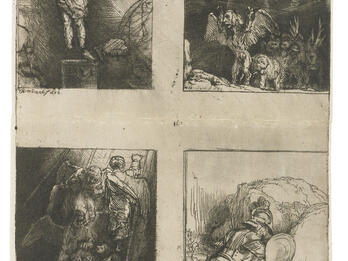Confession
Isabel Rodríguez of Agudo
1501
I admit my guilt . . . in that I was told of a maiden who was [there] the daughter of Juan Estevan who had ascended to heaven and was approached there by an angel, and how she had told of the many marvelous things she had seen there and how Elijah was due to come and prophesy and the Messiah would come to take the conversos to the Promised Land…
Creator Bio
Isabel Rodríguez of Agudo
The New Christian Isabel Rodríguez lived in Agudo, Spain. She had renounced Judaism, confessing her sins (which included eating kosher meat, fasting on Yom Kippur, keeping the laws of Passover, following mourning rituals, and giving charity) and devoting herself to the Catholic church. However, in 1499, Isabel heard about the child prophetess Inés of Herrera. She subsequently visited Inés in her father’s home and listened to the accounts of her visions. Rodríguez believed the child’s prophecies of redemption, even sewing a special blouse that she planned to wear on the journey to the Promised Land. She began to observe various Jewish laws, including lighting Sabbath candles, avoiding eating nonkosher animals, and fasting on Mondays and Thursdays. Isabel was arrested by the Inquisition and interrogated in 1500/1501.
Related Guide
Early Modern Rabbis and Intellectuals on the Move
Carrying books and knowledge, itinerant rabbis and scholars traveled between communities, facilitating cultural exchange.
Related Guide
The Rise of Kabbalah
Kabbalah spread widely after the Spanish expulsion. The Zohar's printing in Italy, Safed's influential kabbalistic center, and Shabbetai Tzvi's messianic movement popularized mystical ideas across Jewish communities.
Related Guide
Early Modern Spiritual Ideologies
Early modern Jewish spiritual life encompassed diverse elements, including theology, ethics, liturgy, and messianism.
You may also like
Account
Letter about Martin Luther
Letter on the Ten Tribes
Ḥayat kaneh (Wild Beast of the Reed)
Miqveh Israel, esto es Esperança de Israel (The Hope of Israel)



